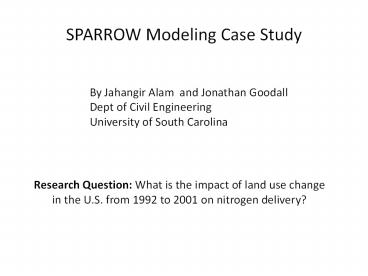SPARROW Modeling Case Study PowerPoint PPT Presentation
Title: SPARROW Modeling Case Study
1
SPARROW Modeling Case Study
By Jahangir Alam and Jonathan Goodall Dept of
Civil Engineering University of South Carolina
Research Question What is the impact of land
use change in the U.S. from 1992 to 2001 on
nitrogen delivery?
2
Observations Database 400 sites
For each NAWQA site where flow and concentration
are available for time period of interest,
relate spatially-referenced watershed
characteristics to observed in-stream load.
3
SPARROW Equations
TNi observed nitrogen loading at station i Sn,j
nitrogen source n for reach j Zj watershed
attributes for reach j Ti,j travel time from
reach j to station i ßn , a, and k calibration
parameters
Smith, R.A., Schwarz, G.E., and Alexander, R.B.,
1997, Regional interpretation of water-quality
monitoring data, Water Resources Research, 33,
12, 2781-2798.
http//water.usgs.gov/nawqa/sparrow
4
SPARROW SPARROW considers to basic processes
in nitrogen transport (1.) Overland transport
(2.) In-stream transport (both are assumed
to follow 1st order decay)
Overland Transport
In-stream Transport
5
SPARROW Calibration
Eno River Basin
Nitrogen Observation Site
Little Creek
Sum all sources for all catchments upstream of an
observed loading
6
Example of Previous SPARROW Application
Nitrogen Transport to the Gulf
Atmosphere
Agriculture
Point Sources
Alexander, R.B., Smith, R.A., and Schwarz, G.E.,
2000, Effect of stream channel size on the
delivery of nitrogen to the Gulf of Mexico,
Nature, 403, 758-761.
7
Procedure
- Prepare land cover data
- Prepare loading data
- Update baseline SPARROW inputs with 1992 and
2001 specific data
8
Procedure
- Prepare land cover data
- Prepare loading data
- Update baseline SPARROW inputs with 1992 and
2001 specific data
9
National Land Cover Dataset (NLCD)
- Products include classifications for 1992, 2001,
and 2006 (in development), and change product
(1992 to 2001) - 30m resolution 25 classes
- http//www.epa.gov/mrlc
10
Urbanization in Columbia, SCChange Product (1992
to 2001)
map of NLCD 2001
Colored Pixels are 2001 NLCD Black Pixels Change
to Urban from 1992 to 2001
11
Urbanization in Charlotte, NCChange Product
(1992 to 2001)
map of NLCD 2001
Colored Pixels are 2001 NLCD Black Pixels Change
to Urban from 1992 to 2001
12
Land Cover Change in the South East U.S.
from from from from from from from from from
to Open Water Urban Barren Forest Grassland/Shrub Agriculture Wetlands Ice/Snow sum
Open Water - 82 26 194 13 190 244 0 749
Urban 33 - 2 2,563 185 720 591 0 4,094
Barren 46 7 - 350 23 71 75 0 572
Forest 30 127 7 - 4,032 5,111 401 0 9,707
Grassland/Shrub 118 55 7 13,961 - 481 782 0 15,404
Agriculture 72 171 4 6,606 701 - 820 0 8,373
Wetlands 477 92 11 1,879 411 996 - 0 3,866
Ice/Snow 0 0 0 0 0 0 0 - 0
sum 775 451 31 25,359 5,352 7,379 2,668 0
all areas reported in units of km2
13
Land Cover Change in South East U.S.(1992 to
2001)
14
Summarizing Land Cover
Modeling Units
1992
61,215 Watersheds
2001
1992
2001
WatershedID Urban
1 534322
2 453221
WatershedID Urban
1 534322
2 453221
15
Procedure
- Prepare land cover data
- Prepare loading data
- Update baseline SPARROW inputs with 1992 and
2001 specific data
16
Data Preparation Workflow Time Series Data
Identify time series of interest
Create sites.csv file
Run FetchWaterML.exe tool to create WaterML Cache
Reformat files from WaterML to LOADEST inputs
Runkel, R.L., Crawford, C.G., and Cohn, T.A.,
2004, Load Estimator (LOADEST) A FORTRAN Program
for Estimating Constituent Loads in Streams and
Rivers U.S. Geological Survey Techniques and
Methods Book 4, Chapter A5, 69 p.
17
Creating a Cache of HIS Data
Sites.csv
cgt FetchWaterML.exe sites.csv
./daily-discharge-2/
output directory
input sites file
Downloaded WaterML Files (one for each time
series requested)
18
Estimating Load from Flow and Concentration
19
TN Loading Data
1988-1996
1997-2005
20
Difference, 92 and 01 Loadings
Loading Difference (kg/yr)
gt - 5.0x106 -5.0x106 - 0 0 - 5x106 gt 5.0x106
(orange/red) increase in loading from 92 to
01 - (blue) decrease in loading
21
Procedure
- Prepare land cover data
- Prepare loading data
- Update baseline SPARROW inputs with 1992 and
2001 specific data
22
Results
23
Results
24
Conclusions
- Our model suggests that nitrogen loadings to
streams have decreased from the 1990s to the
2000s by on average 1 kg/ha/yr (or roughly 10).
It also shows a shift in the relative
contribution of nitrogen sources with a greater
contribution from urban land use areas in the
2000s compared to the 1990s. That said, the
current model assumes fertilizer application
rates, point sources loadings, and animal
populations are constant over time because it is
difficult to obtain differences between these
numbers of the two time periods of analysis.

